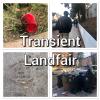Visualizing Toxicity within UC Workforce: A Fight against Race, Gender, and Income Inequalities
I am interested in investigating the race, gender, and income disparities that are produced by UC schools within their workforce. While identifying vulnerable communities by analyzing literature, news, technical reports, and statistics on this recently debated issue, the study will also examine the types of governance systems that hold prime accountability in contributing to and exacerbating toxic conditions and their injuries.






